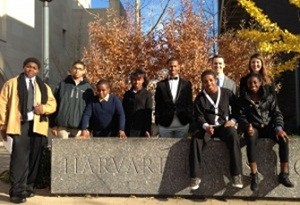 Upon first meeting his new client Javon, aka “Yung Fresh,” clinical student Brett Heeger (HLS ’14) asked if Javon’s recent performance to over one hundred corporate leaders from Converse was his biggest performance. “No,” Javon casually replied, “at the Boston Urban Music Festival, I performed to about 50,000 people.” At the time of the Festival, Javon was fourteen years old.
Upon first meeting his new client Javon, aka “Yung Fresh,” clinical student Brett Heeger (HLS ’14) asked if Javon’s recent performance to over one hundred corporate leaders from Converse was his biggest performance. “No,” Javon casually replied, “at the Boston Urban Music Festival, I performed to about 50,000 people.” At the time of the Festival, Javon was fourteen years old.
Javon is the senior member of Studio Heat, a group of young Boston musicians that have grown out of the Music Clubhouse at the Blue Hill Chapter of the Boys and Girls Club in Boston. Ranging in age from pre-teen to 18, some of these students have already achieved measures of success that many adults will never obtain. A recent visit to the group’s facilities in Dorchester found students engaged in music lessons, songwriting sessions and laying down tracks, led primarily by senior students in Studio Heat and volunteers.
On November 11, 2013, Heeger and the Harvard Transactional Law Clinics (TLC) had the chance to welcome seven middle and high school students from Studio Heat to HLS as part of an introduction to the broader world of the music business. After a brief tour of campus, the group engaged in a mock negotiation intended to teach the students about the role of lawyers in the music industry. The students served as junior attorneys in a negotiation between Royal T (derived from a negotiation exercise created by alum Rafael Mares ’99 while a student in the HLS Recording Artists Project), a fictional recording artist portrayed by Clinical Fellow Amanda Kool, and a fictional record label, Ames Production Company, represented by TLC student Josh Wackerly (HLS ’14). Heeger filled the role of senior attorney on behalf of Royal T, while Professor Brian Price, Director of TLC, served as senior attorney for the production company. Over nearly two hours of client meetings and negotiations, the Studio Heat ‘attorneys’ were able to draft a record deal addressing a number of essential contract terms, including the term length, advance payments, and ownership of creative rights.
In a debrief over refreshments, students reflected on the exercise and discussed the important and surprisingly large role of lawyers in the music industry. Kirkland Lynch (HLS ’14) and Lauren Gore (HLS ’14) also joined the conversation to share their experiences working in the music industry and attending law school. Each emphasized how important building a supportive community can be to making choices that might lead to a path of success, whether as an artist or to Harvard Law School. The young students shared their own aspirations, in the music industry and otherwise. One student commented that he now realized that signing a record deal didn’t equal instant fame or success while another admitted that she was considering becoming a lawyer if her plans to make it as a hip hop artist didn’t pan out. Rick Aggeler, Senior Music Director of Studio Heat, said, “[The kids] were so thrilled about the whole experience. From the tour itself, to working with “Royal T”, and having Brett and Brian act as advisors during the negotiation, it was honestly for me as well one of the coolest field trips I’ve ever gotten to take our kids on.”
The Studio Heat visit to Harvard Law School grew out of TLC’s new Community Enterprise Project (CEP), a sub-clinic of TLC that Kool is in the process of growing into its own, stand-alone clinic. CJ Azubuine, Senior Manager of Harvard’s Office of Event Scheduling and Support and volunteer at the Music Clubhouse, originally contacted Professor Price with some basic legal questions related to Studio Heat. “We’re continuing to help Studio Heat out with some really interesting legal issues, including questions of copyright and licensing when all of the students are minors,” Heeger explained, “and the great part of CEP is that we’re encouraged to think creatively about how to bring our legal expertise to bear to serve our clients.”
Where TLC operates much like a law firm by responding to client requests for direct legal services, CEP aims to engage traditionally underserved neighborhoods in a more proactive way, partnering with community organizations to identify organizational and community needs and develop comprehensive strategies, whether legal or otherwise, to address those needs. Price explains, “When the Clinic moved from the Legal Services Center to campus, we lost some of our connections to Boston’s neighborhoods. I am thrilled that CEP has reemerged and glad to see TLC clinic students back in Jamaica Plain, serving people in and around that community.”
Law students have also responded positively to this opportunity; Heeger and Wackerly are two of the three students in the Community Enterprise Project this semester, and Kool expects the program to contain six students next semester. Heeger reflected on how CEP’s approach to lawyering influenced his representation of Studio Heat. “Here, in conversations with Rick, CJ, and Javon, we realized that the kids themselves could really benefit from an engaging experience with music law, rather than exclusively receiving traditional legal advice from their lawyers. With the team emphasis of CEP, and encouragement from Brian and Amanda, we were able to put together a broader program that was educational and I think extremely fun for both sides.”
